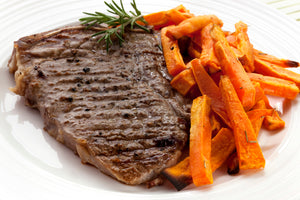MCT Oil Vs. Coconut Oil: Which Is Best For You?
By Connor Young on
Medium-chain triglycerides (MCTs) and coconut oil often get used interchangeably in the nutrition world. They’re both types of oil that come from coconuts, but MCTs are a purified, concentrated type of coconut oil.
That’s not to say one is better than the other. Just the opposite, in fact. Both coconut oil and MCT oil offer powerful health benefits ranging from weight loss and better brain function to increased energy levels. Your body just uses them in different ways. Which one is best for you depends on your goals (spoiler alert: we’re fans of using both).
So what exactly do MCTs do, and how are they different from coconut oil? And what are the pros and cons of each? Read on to find out.

MCTs: quick energy without fat storage
MCTs are a special class of fat that comes from coconut oil, palm oil, and goat’s milk. There are three main types of MCT, categorized by the number of carbons they contain. From shortest (8 carbons) to longest (12 carbons), they are:
- C8 (caprylic acid, ~7% of coconut oil)
- C10 (capric acid, ~8% of coconut oil)
- C12 (lauric acid, ~48% of coconut oil)
What sets C8 and C10 MCTs apart is the way your body uses them. Long-chain fats go through your stomach, break down in your small intestine, go through your lymphatic system, absorb into your bloodstream, and get into your cells for energy (you can find a more in-depth look at fat metabolism in this blog post).
C8 and C10 are different. They skip digestion and go straight to your liver through your portal vein. Your liver breaks them down into ketones (little bundles of energy) and sends them right out into your blood for delivery to energy-hungry cells. That quick conversion to ketones can make C8 and C10 MCTs valuable when you want a burst of energy, without the crash many people get from sugar or stimulants.
If your insulin spikes, most fats and carbohydrates in your bloodstream will be stored as body fat (say, because you ate a carb-heavy meal alongside the fat). C8 and C10 MCTs don’t store as fat – the ketones will just keep circulating, and if you don’t use them, you’ll pee them out.
You may notice that C12 wasn’t included in the above explanation. That’s because while C12 is technically categorized as an MCT, it behaves in your body like more typical fats. That’s not a bad thing – in fact, you’ll learn about how unusually valuable C12 is in a minute. But for all intents and purposes, C12 is not an MCT.
Don’t be fooled by companies that claim their coconut oil is 60% MCTs; the vast majority of that is C12. If you want the benefits listed below, buy pure MCT oil with C8 and C10.
C8 and C10 MCTs have a few particularly valuable uses.
MCT Oil Benefits:
- Fat loss. MCTs are thermogenic – you use a lot of energy processing them, which means they can make you burn more calories and increase your daily energy expenditure. Several studies have found that swapping more typical dietary fats (think olive oil, butter, etc.) with MCTs increased the calories people burned [1,2], and eating MCTs daily long-term led to gradual fat loss [3].
- Hunger suppression. Several studies have found that MCTs lead people to feel more full on fewer calories [4,5,6]. This could be because your liver turns MCTs into ketones. Ketones suppress ghrelin, a hormone that makes you hungry [7], and increase cholecystokinin, a hormone that makes you feel full [8]. You can get into ketosis through diet, but MCTs offer a quick spike of ketones that seem to mimic ketosis long enough to suppress your appetite.
- Quick energy. MCTs are also a great way to get a quick burst of energy without the crash that comes from sugar or stimulants. Try taking MCTs before a workout or during a mid-afternoon slump. They’re also useful if you’re just starting a ketogenic diet and you’re struggling with the transition from burning fat to burning carbs. Many people also report that MCTs improve their cognitive function.
- Digestive issues. Too much MCT oil causes urgent digestive distress. Don’t push your limits with this stuff. If you’ve never had MCT oil before (or it’s been a while), start with about a teaspoon at a time. Give your body a week or so to adjust, then you can begin bumping up to a tablespoon, and then two. That’s probably a good place to stop. MCT-related digestive issues are very unpleasant.
Basically, MCTs are great for targeted use. If you want some quick energy before a workout or are looking for a little edge with fat burning, MCTs can be an excellent tool. But MCTs can cause digestive distress in large amounts, so you’re better off treating MCT oil as a supplement, not a main fat in your diet.
Now let’s talk about coconut oil.
Coconut oil: Steady energy and immune system support


Coconut oil has a range of interesting fatty acids in it. It has some C8 and C10 MCTs (~10%), but the star of the show with coconut oil is C12 (lauric acid).
As we mentioned above, lauric acid is categorized as an MCT, but it doesn’t behave like one. Lauric acid, like longer-chain fats, goes through your small intestine and relies on bile for metabolism, so it won’t spike ketone levels the way other MCTs will [9].
That said, lauric acid imparts some other pretty cool benefits, as does coconut oil in general.
Coconut oil pros:
- Antiviral, antifungal, anti-everything-else. Lauric acid makes up about 50% of coconut oil. When lauric acid reaches your small intestine, you convert it to monolaurin, a powerful antimicrobial compound. Monolaurin kills off pathogenic bacteria, fungi, yeasts, viruses – everything from E. coli [10] to Candida [11] to herpes [12] to swine flu [13]. A lot of health bloggers promote coconut oil for things like gut health because it’s so powerful at killing pathogens. We didn’t find any compelling studies on the topic, but considering monolaurin’s impressive antimicrobial resume, your immune system probably won’t be too upset if you eat coconut oil regularly.
- Skin health. Monolaurin performed on par with antibiotics (and, in fact, killed antibiotic-resistant Staph infections) when applied to skin infections [14]. It also didn’t lead to drug resistance the way antibiotics do. Does this mean you should ignore your doctor and start treating serious ailments with coconut oil? No. Definitely don’t do that. But coconut oil could be good for skin care, both in terms of moisturizing and keeping bacteria at bay. Fair warning: coconut oil clogs pores for some people [15].
- Stable energy. Coconut oil is full of of saturated fat. We’ve written about saturated fat before. Basically, we’re not convinced it’s good or bad – it’s just a solid source of energy that won’t spike your insulin or blood sugar. If you’re on a high-fat, low-carb diet, coconut oil is a great healthy fat source.
- Good for cooking. Coconut oil’s saturated fat content also means it withstands high heat without breaking down. It’s great for sauteing, pan-frying, baking, and pretty much any other higher-heat cooking method. If you don’t like the coconut taste, go for refined coconut oil.
Coconut oil cons:
- Misleading MCT advertising. A lot of coconut oil companies put on their label that coconut oil is 60% MCTs. That’s technically true, but it’s misleading. Most of that is lauric acid, so you aren’t getting the ketone-producing benefits of MCT oil. Of course, now that you know this, you can just take MCT oil for your ketone needs, so this isn’t really a con anymore. Tell your friends.
- Suppresses hunger less than pure MCTs. Coconut oil isn’t as satiating as MCT oil [16]. If you’re looking for hunger suppression (maybe because you’re trying to lose a few pounds), go for the MCT oil, or combine the two to get the best of both worlds.
Coconut oil is an excellent source of energy with some impressive antimicrobial properties. It’s no better or worse than MCT oil; it’s just different. Both have their place in a healthy diet, and both are valuable tools in eating well.
Do you use MCT oil? Big fan of coconut oil? Let us know in the comments. Thanks for reading and have a great week!
← Older Post Newer Post →





